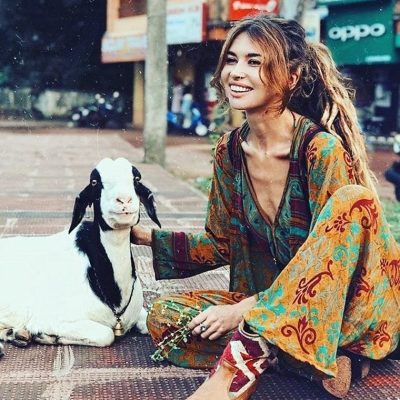A short story by Anne Leigh Parrish
Support independent, non-corporate media.
Donate here!

Eric poured himself another glass of wine, leaned forward in his chair, and fixed Flora with a loopy, cock-eyed gaze.
“Well?” he asked.
“Motherland.”
“That’s awful.”
“Why?”
“Too Nazi.”
“You’re thinking of Fatherland.”
“Yeah, you’re right.” He poured her some wine, too.
Eric didn’t think the farm needed a name, even though all the neighboring farms had one. Flora’s favorite was Singing Jay. Another was Shaded Hills, though that sounded more like a subdivision. When customers at the farmers’ market asked Eric what theirs was called, he said Eric & Flora. She hadn’t agreed to that, and told him so again, as she brought her glass to her lips.
He said they’d talk about it later. He gave her a good look and said she should wear her hair down more often. It was thick and wavy and normally pinned to the back of her head. Now, wearing another embroidered blouse, she looked like a real earth mother, he said.
She was approaching forty and liked to think of herself as timeless. Eric was ten years younger and thought of himself as cutting edge because he’d thrown himself into the land with passion and zeal. He’d majored in botany and taught himself what books never could. His lettuce and tomatoes were prized. He’d inherited the land from his mother, hence Flora’s suggested name for it.
Brenner came through the door and said the goats were good for the night. Eric nodded wisely as if Brenner had delivered a life-changing sermon. Whenever Brenner addressed Eric, he waited for a response. If there’d been none, he’d have stood vigil until one came. Brenner worshipped Eric for letting him live there. Brenner was writing a top-secret manuscript about robots who fell in love with trees, or about trees that could speak, Flora couldn’t remember. She read a page or two when she went in to ask if he’d seen her glue stick. He was in the bathroom, and his laptop was open. Now, in the kitchen with flickering candlelight making them all better than they were in the daytime, Brenner took on a ruggedness the morning would negate. He said he’d be up bright and early to welcome the new hire.
A cheese-maker. Hestia. Not her real name, of course, which was Jane or Joan or Jill. In the email she wrote applying for the job she said she was reinventing herself. From what and into what she didn’t say, but Eric didn’t need specifics. He was taken with the idea, and became fascinated, sight unseen.
Flora went up to her crafts room. It was cold and she was too tired to lay a fire in the stove. She didn’t mind working with a chill in the air. It cleared the mind, didn’t it? She surveyed the construction paper laid out on the drafting table, all in shades of red. She preferred white paper with black ink, but Eric said she had mined that vein to death and should try something brighter and more lively, so now there were reds and crimsons and one she thought of vermillion, though it was hard to tell it apart from magenta. The paper was thick, good-quality, and expensive. After it was folded lengthwise then across, basically in four, she painted a floral design in a repeating pattern on the cover, sometimes on the inside, but blank cards were more popular. People liked to add their personal touch with cute sayings, advice, compliments, anything to inspire and distract. Inspire and distract. Flora liked that. It was a good mantra. It steadied her hand. Her lines flowed smoothly. Her ink never dripped.
Her cards sold well at the farmers’ market, better even than Eric’s produce. Eric said they were going to make it financially, and Flora hoped he was right. He had to be. None of them could hold a job. Flora waited tables off and on. That’s where she met Eric, who just got fired from his fourth construction job. As to Brenner, his resumé was equally thin. His brother sent him money. Sometimes Brenner said it was because he believed in his writerly gifts. Other times he said it was because the brother didn’t want him showing up with his hand out. Brenner swore he wasn’t that kind of person, and hoped Flora believed him.
Over breakfast, she again raised the issue of what to call the farm. They couldn’t go on calling it Eric & Flora. Eric reached across the table and took her hand.
“It’s changed, hasn’t it?” Eric asked.
“It has.”
They weren’t sleeping together anymore. Whatever they had fizzled out. At first, he’d been obsessive in his pursuit of her, and when she yielded he lost interest. Since her interest was never all that keen, there were no hard feelings. He was going to move across the hall, which would still leave an empty room for Hestia. The house was big and well-built. It had been a family vacation home when Eric was young. His family came up from California every year. Now they stayed home, even with all the forest fires. Oregon had its share of those, too, but so far the land hadn’t been touched. Eric said it was blessed with the spirit of an ancient race that had roamed the earth until she found the neat rows of seeds Eric had planted. Order from chaos, that’s what the spirit craved, and having found it, offered the reward of keeping chaos at bay. Flora told him to let Brenner spin the yarns, though it wasn’t bad, as tales went.
A vehicle came up the dirt road toward the house. Eric and Flora let each other go and went to see. A pickup truck was idling in the driveway. A young woman got out of the passenger seat. Her head was shaved and tattoed. She’d be a big hit at the local farmers’ market, Fiona thought wryly. Their competitors were left-over hippies or never-were hippies, but there were no Goths among them. Or maybe the look was Punk. She could never tell the difference.
Hestia shouted an obscenity at the driver, an older man in a baseball cap, who sat impassively, not looking at her, just tending his idling truck until she was out of the way. Then he drove slowly back the way he came. Hestia had a backpack and a guitar case with her. Flora hoped she played well. Music in the evening would be lovely.
Introductions were made. Hestia wanted to see the goats. The goats had to be assessed for their cheesy potential. Eric lost it when she said that. Hestia blushed and said she realised it sounded stupid.
“Don’t worry about him. He’s easily amused,” Flora said. Eric took Hestia over to the barn and Flora said she’d take Hestia’s stuff in if she wanted. Hestia said not to touch anything. She’d take care of it later.
Brenner came down and asked what she was like.
“Just what this place needs,” Flora said and set the table for lunch. They were having quiche again. She made good quiches and wanted to sell them at the market. The trouble was how to keep them cold. Styrofoam coolers with ice would work. She’d get those on her next trip to town.
Today’s quiche was mushroom and cheddar. It struck her that the ingredients came from the grocery store, not the farm. They’d have to do something about that. Mushrooms could be grown indoors. As to the cheddar cheese, you could make that from goat’s milk. She’d talk to Hestia about it.
Hestia proved tamer than she looked. She covered her mouth when she laughed, and like to wear yellow. The tattoos on her skull, Celtic-themed, became gradually obscured as her hair grew out. It was as if she’d shaved her head to reveal them and herself, for her arrival at the farm. Once accepted, they were no longer needed, like a dagger slipped back in its sheath. She was good with the goats and making cheese from their milk. She added honey and lavender and sometimes a hint of lemon. Then she baked bread and offered up a plate for the others to sample. Eric sang her praises with every bite.
Flora thought they should host a wine tasting to celebrate Hestia’s cheese and promote the farm. Eric said it was a good idea. The house had a wine cellar and it was well-stocked with deliveries they got from town. Flora thought they should hit up the local vintners. They could offer their wines, carefully paired with the cheese and other tasty treats, and the farm would get an epicurean reputation. Eric didn’t like the sound of that. He’d had a run-in with Garrett Fain, owner of Westridge Winery over how he disposed of his grape pomace. Fain used it as compost, which attracted insects, which liked to visit Eric’s farm. Flora remembered a lot of tense emails flying back and forth and finally, Fain agreed not to use it. Westridge made a first-rate pinot noir and Flora thought she’d contact Fain, smooth out any remaining bad feelings. She’d wait until Eric was doing something else. She knew the password for his computer and his email account. She’d tell him about it later.
Eric, now installed in his own room, soon invited Hestia to join him there. Hestia turned him down because she’d fallen for Brenner, who said he’d found his muse.
A full heart made her cheese taste even better, Flora thought. Her own heart, free of Eric, made her work flow. Brenner, in the shine of sexual satisfaction, said his book would be done any day. Eric had nothing to say and cast a shadow in every room he occupied.
Flora confronted him. She told him he was being a downer. He said he’d fallen in love.
“With Hestia? You barely know her,” Flora said. She’d summoned him to her craft room where the climbing clematis she’d worked on for weeks had been replaced by a tangle of stargazer lilies with curving stamens.
“Our souls know each other. Our souls are old,” Eric said. He was drinking a limited-release California cabernet from the bottle. His teeth were purple. Flora reached for the bottle, he gave it to her, she took a swig and gave it back.
“You thought you were in love with me, remember?” Flora asked. Eric waved his hand dismissively.
“That was just a trial run. This is the real thing.”
“Well, she doesn’t feel that way.”
“You think I don’t know?”
He dropped down in the spare chair, causing it to creak and groan.
Flora said he was looking for something Hestia couldn’t give. Maybe no one could. It was no good, latching onto people the way he did. But in time he’d be better, calmer in himself.
“What am I supposed to do until then?” he asked. He hadn’t brushed his hair for several days. It was flat on one side and bushy on the other. Flora felt a twinge of affection for him. She’d always been drawn to slobs.
“Tend your garden,” she said. “The garden is everything.”
“The lettuce is looking particularly fine, I have to admit. And the basil is quite fragrant.”
“See? All will be well.”
But the passing days proved her wrong. Eric simmered below the surface, especially toward Brenner, who was unhappy about the perceived disloyalty to his benefactor. Brenner approached Eric man-to-man and said there must be no hard feelings. The human heart was a funny thing, and it wanted what it wanted, with no rhyme or reason. Eric said he appreciated Brenner’s candour, but he was caught in love’s snare. All he could do was wait until it set him free.
Hestia and Brenner ate separately because Eric couldn’t sit at the same table. Flora told him to get a grip. This was a commune and they needed to live communally. Eric relented. He had opened his home to these good people, and he would break bread with them, too. He encouraged Hestia to play her guitar, but it remained silent. To Brenner, he was jovial and said several times he couldn’t wait to read his masterpiece. At this, Brenner beamed, his already-wide face stretched further across the thick bones of his skull.
Yet the air remained cold. Flora felt it. If the others did, too, they didn’t show it.
They went to the farmers’ market in town and left Eric home. He said he had bills to pay. Flora knew he couldn’t stand to see Hestia and Brenner together. In his soul, Hestia had taken on the power of god. She could give or take away, at her whim. Hestia had no idea about any of that. She was just another person trying to find her bliss. Flora thought if Eric would apply himself to useful things as much as he did to his lust and longing, the farm would be a showplace.
They sat at their table in the market. People bought Flora’s cards and tasted Hestia’s cheese, kept fresh by the new cooler. Flora had made a large sign that said Motherland, with an image of a woman opening her arms to cultivated land. The woman had her back to the viewer, which Brenner said was a nice touch. Hestia strummed her guitar and sang in a high, rich voice that made Flora think of water coursing over rocks in the forest. People clapped when she stopped and begged for more.
Before they went home they went to a bar in town for beer. Flora used Eric’s credit card. He didn’t know she had it, but she figured it was all right since she only bought one round. They’d had a good day and were in a party mood.
The lovely day slid into a lovely early evening and Brenner drove Eric’s truck into the hills toward the farm. They sat three across, with Hestia’s guitar in the back.
Eric’s tractor blocked the driveway. He’d driven it over the rows of lettuce, tomato, basil, and some recently planted beans and corn. Then he’d flooded them with water from the hose. The goats were out of the barn, picking their way around everything, displaying a calm lack of concern that disappeared when Flora got out of the car and started shouting for Eric. The goats lifted their heads and trotted away. Eric came out the door and stood on the porch. He seemed drunk. He held the blade of a kitchen knife over the veins in his wrist.
“What are you doing?” Flora asked.
“What you all want me to do.”
“Hey, man,” Brenner said. “You need to chill.”
The thinning light found the blade and made it glow.
“This is all your fault,” Eric said to Hestia.
“Eric,” she said.
Eric looked around at his destroyed land. He seemed peaceful until he took in the group standing in the driveway.
“What makes him better, anyway?” Eric asked.
“Put that down, do you hear me? Put it down at once,” Flora said. She felt like she could lift off and swoop down on him from above.
Eric stood, his eyes empty. No one moved, and no one spoke. Eric drew the blade across his skin, causing a thin harmless trickle of blood. He stared at it. Flora climbed the porch steps, took the knife from him, and tossed it over the rail, into the bushes.
She ordered him to show her the wound. It was deeper than she thought. It would need stitches. She told Hestia to go into the kitchen and get a clean dishtowel. Hestia looked at Flora blankly.
“Wake up. Go get that towel,” Flora said.
“Where?”
“In the drawer next to the sink.”
Hestia went past them into the house. Eric didn’t watch her go. She came back with the towel and gave it to Flora who put it on Eric’s wrist. She told him to put pressure on it. He sat down in one of the wicker chairs on the porch as if his legs couldn’t hold him any longer.
Flora told Brenner to drive Eric to the hospital in town. He was to be candid about what he’d witnessed. The police might become involved. The hospital probably had a protocol about how they handled attempted suicides. Eric focused.
“I wasn’t trying to kill myself,” he said.
“Sure looked that way to me,” Flora said. “Now, go with Brenner.”
“No.”
“No choice.”
She waited, hearing his uneven breathing. The blood wet the towel.
“You’ll be all right. Now, go,” she said.
Eric sat until she touched his shoulder, then stood up and went down the stairs.
“You stay here with me,” Flora said to Hestia.
They watched Brenner and Eric drive down the road. Flora wondered if Eric could be trusted. She said she hoped he wouldn’t try to jump out, or worse, attack Brenner in some stupid jealous fit. She should have thought of that earlier. Hestia said it would be okay, Brenner had a gun in his boot. He always had it.
“Yeah? I wish I’d known about that. He’ll have to get rid of it when he comes back. I don’t want it on the farm.”
Hestia said she better go see if she could round up the goats and get them back in the barn. Flora said she couldn’t assess anything until the water drained, but assumed they’d have to start over from scratch. They’d replant everything, and even add some crops.
“Pea vines. They give the best flowers,” Hestia said.
“Zucchini and pumpkins. We could clear the acreage behind the barn for a pumpkin patch, get people out here in the fall with their kids. Sell cider. He never collects the apple crop, just lets them fall and rot.”
“I can learn how to make cider. We’ll need an apple press.”
“We can get one.”
Hestia walked off, calling the goats, who trotted her way. They had come to love her.
Flora sat in the chair Eric had been in. It would be easier if he didn’t come back for a while. Maybe his family could persuade him to stay away until he could face what he’d done. It would take time for him to be all right again. Lots of time.
Flora gazed at the sea of mud and silently thanked Eric’s spirit of chaos for not keeping herself at bay and bestowing a blessing on them all.
*
Award-winning writer Anne Leigh Parrish’s next novel, an open door, will be published in October 2022 by Unsolicited Press. Recent titles from Unsolicited Press are the moon won’t be dared, a poetry collection, October 2021, and a winter night, a novel, released in March 2021. She is the author of nine other books. She has recently ventured into the art of photography and lives in the South Sound Region of Washington State. Find her online at her website, Twitter, Facebook, Medium, Instagram, Linked In, and Goodreads.
If you enjoyed this story, please consider donating to Product. We’re an independent publisher with charitable status (SCO 29793). The magazine is edited, designed and produced by volunteers, with all contributions given for free. We showcase work by new writers, artists and photographers at an early stage in their careers, many for the first time. A small donation makes a big difference towards the running costs of the magazine. Please donate here:









